In this video, produced by Craft in America, Miguel Gomez Ibanez, the president of North Bennet Street School in Boston, talks about how hand-skills training has been at the core of all of its programs. Founded in 1885 by Pauline Agassiz Shaw, the school has been a proponent of the sloyd system of training, which was developed in Sweden and emphasizes the development of hand skills in conjunction with mental skills. The original theory is that handcrafts, such as woodworking, helped build character, intelligence, and industriousness. NBSS, originally known as Gustaf Larsson’s Sloyd Teacher Training School, helped shape the creation of industrial arts programs in the United States. With the demise of many shop programs due to budget cuts, the video is quite thought-provoking.
RESOURCES: Woodworking For Kids
Noted woodworker, author, and educator Doug Stowe produced a series of articles and woodworking project plans aimed at the youngest potential beneficiaries of this philosophy of woodworking as education. Read his article Woodworking for Kids for a comprehensive discussion of the sloyd system, and download his thoughtfully developed Kid’s Woodworking Project Plans so you can introduce a young person to woodworking.
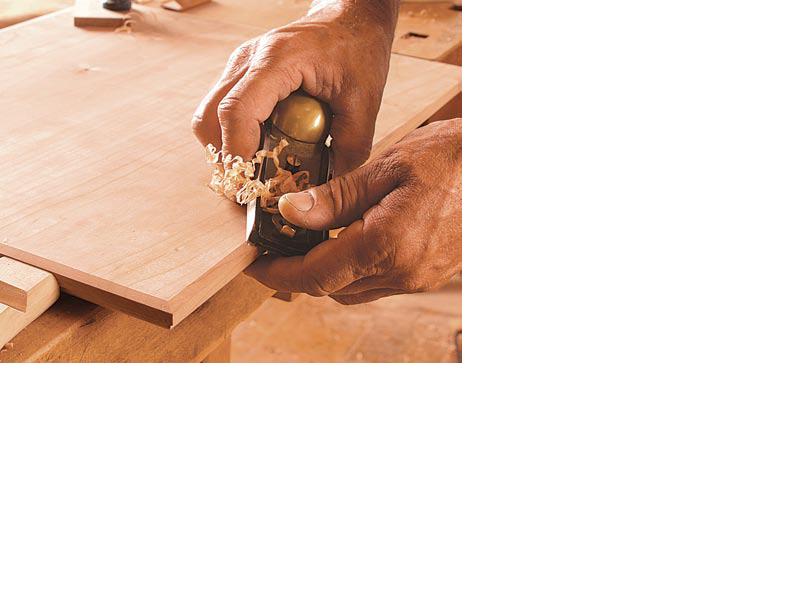

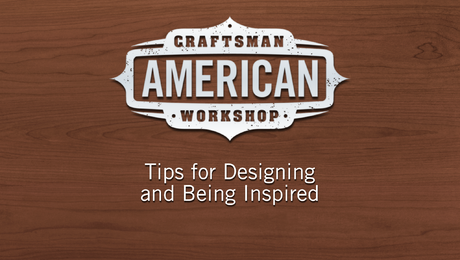
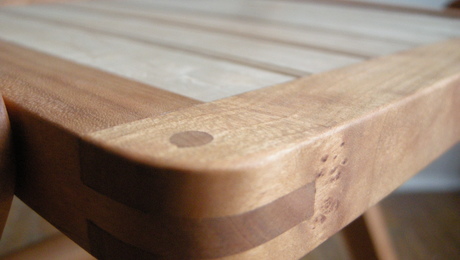
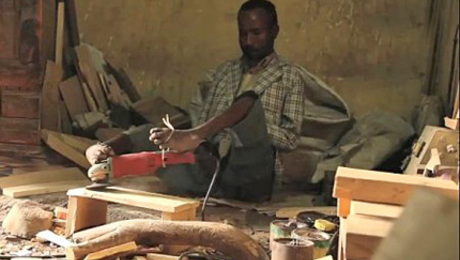
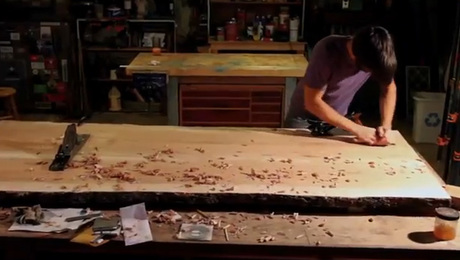


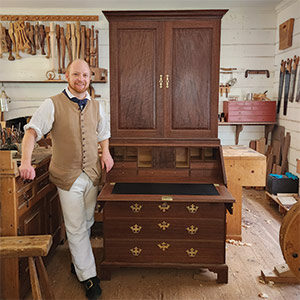
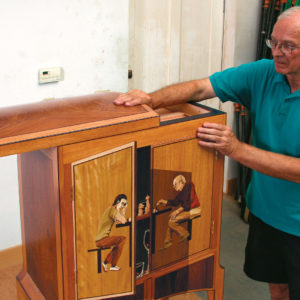
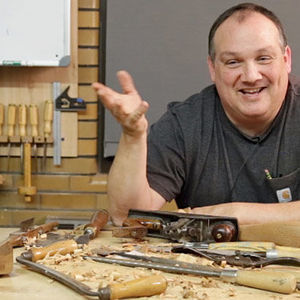












Comments
I completely agree with the idea that teaching hand skills is relevant, even in a digital age. A parallel exists in teaching analog photography basics to budding photographers who have only experienced the use of digital cameras. Both lead to better understanding and a more well-rounded mind.
Teaching hand skills, of course, goes back thousands of years - back to the time that learning flint napping, for example, was essential to bring home dinner. Back then, outsourcing the task to manual craftspersons in China or India wasn't possible.
I certainly agree.. although I am a student in a woodworking program so i might be biased. I have noticed that woodworking has really made me conceptualize things more and thing about how they work and how they are put together (the goes beyone just the physical, but into how one might design a work of music, a piece of literature, the list goes on). I simply can't see how this could not benefit someone both academically, and in developing better skills in the high tech area.
I agree!
By intuition, admittedly without expertise, I think the brain works with tools such as the imagination, paper and pencil, visual constructs, and input from the hands. Since hands are uniquely human, it would come as no surprise that some cognitive functions of our uniquely human brains depend on its integration with the "knowledge" supplied by the hands. How interesting that very young children rarely are satisfied with seeing a new thing, they want to touch it and handle it.
It seems like some of the richness of life is lost without working with one's hands. Practically, we all can eventually use handiwork skills, even if it is just installing some moulding or fixing a lamp. Hands are not just for tapping a keyboard and mouse!
Miguel, great job with the video. American Woodworker has made my Sloyd articles from Woodwork Magazine available on-line at the following url: http://americanwoodworker.com/search/SearchResults.aspx?q=sloyd
North Bennet St. Industrial School and Gustaf Larsson's Sloyd Teacher Training School were actually separate institutions, both at the same location, 37 North Bennet Street, and both with the same benefactor, Pauline Agassiz-Shaw. Of the two institutions, the North Bennet St. Industrial School was founded first having grown from the North Bennet St. Industrial Home to become a school by around 1883. Agassis Shaw invited Gustaf Larsson to found the Sloyd School to share the North Bennet St. School premises in 1888.
By 1908, the 37 North Bennet Street Location had become too small for both schools, and so Mrs. Shaw built a new school for Gustaf Larsson's Sloyd Teacher Training at 7 Harcourt St. in Boston. You can find that building using Google or Google Earth including a street view. The building is currently occupied by a Property Development Corporation. Google 7 Harcourt St. Boston, MA to find it. Or you can visit my blog for a street view and floor plan. http://wisdomofhands.blogspot.com/2009/10/second-sloyd-training-school-in-boston.html
I'm not familiar with the programme, but looking around me here in Ireland these days where very few indeed have practical, technical or craft skills it's so obvious that there is a huge gap in our education.
Young couples all over the place, paying enormous prices to second rate 'craftsmen' for sloppy work that's actually a nothing. This on top of lots having got caught in the recession with enormous mortgages and so on.
It's really only those from some farm backgrounds, or who came from hands on families that are the exception.
Worst of all perhaps is the amount of psychological insecurity, technophobia and inability to see the role of technology in society - it's going i think to cost us dear....
From our experience homeschooling our family, as well as teaching school, we'd certainly agree that hand-skills are a crucial part of developing both mind and character. Sadly, we have seen the demise of both woodshop and home economics programs in schools. As the building chairman for a number of Habitat for Humanity homes, I found that our skilled volunteers were almost without exception older men and women--the young volunteers had almost no idea how to work with their hands, nor the patience for it.
Lynn and Jane Tilton
From our experience homeschooling our large family, as well as teaching school, we'd have to agree that developing hand skills is crucial to development of both brain and character.
Sadly, schools are abandoning both wood-shop and home economics classes, as well as art and music--all of which we feel are necessary to total education and development.
From our experience as building chair for a number of Habitat for Humanity homes, out skilled volunteers were, almost without fail, older men and women. The younger volunteers had very little skill or experience and not much patience to acquire it, either.
Both of my two passions, music and woodworking, were introduced to me at a public middle school, and as a young girl, there was no other venue to gather this kind of exposure to woodwork in particular.
I took what was called 'design and technology' and I excelled at it, being motivated by the tools, the projects and most importantly for the young student, the completed product. Never having been a particularly attentive student, I found myself moved to work through my lunch hour to finish such important works of art as a chessboard and a turned bowl.
After middle school I never did any more shop classes, but the memory of working with tools and wood never left me. I dropped out of University to become a cabinetmaker, and eight years later (also having finished my degree)my love for woodworking is growing. I would never have had this door opened for me if it hadn't been for those classes, and I have always thanked my teacher for being so encouraging.
I find it very discouraging to know that these courses are being cut from public schools. I have definitely seen how a lack of practical knowledge about the way the world around us works is epidemic among young people. Cutting these courses, which were some of the most challenging, interesting and stimulating ( a much needed break from Math and English, sitting at a desk, looking out the window), is a huge mistake. I don't know any students who didn't enjoy at least the difference in atmosphere in the learning environment.
Hi there from across the water in the so called old world, personally I think that all hand skills should be continually taught, in fact I believe that today they are even more important than ever. As a retired (not through choice) Computer Systems Programmer and still very "eu fait" with technology the need for traditional skills in wood working and metal working will continue to be of value, why, well as more people enter the world and fewer job's become available these fundamental skills will always be needed; as a low income couple I look to my self taught skills as bad as they are to not only give me something to occupy my mind but to provide my wife and I with unique pieces of furniture, my metal working skills help me daily to make and mend and my wood work gets better each time I pick up my tools. So is it worth spending the money on providing hand work skills most defiantly. Teaching shop was fun and helpful to me and I truly believe that it’s continuance will benefit those who do them in the future.
Our son attended a Waldorf school for middle school. From with the recorder bag he knitted,to the lounging pyjamas he sewed, the stuffed animal he designed and built, the scoop and egg he carved, and the cherry kitchen stool he made from scratch, the hands-on arts and crafts activities were a constant highlight, an enduring memory, and incomparable training in developing a sense of competence.
Absolutely!! When I was in middle and high school in the mid to late 1960's girls weren't allowed to take any kind of shop. But since I was already tailoring my own clothes and making the family dinner every night--I petitioned the principal to be allowed in--no dice!!
So most of my wood and metal skills came self-taught until I returned to finish a BA at the age of 50. Between working in wood and steel sculpture studios I finally had access to real training. Imagine bending steel in the morning and dovetailing in the afternoon for the first time at age 51.
As an artist and arts instructor I have seen the incredible benefits for children of all ages when they are given the skills to work--in any medium. I have worked with at-risk children and well-supported kids--in all manner of teaching setting. Each time I see a rise in self-esteem and a raise in respect for their, and others' work. Curiosity rises and every other core academic subject benefits. Imagine not using math in design and construction measurement!
There are psychological benefits to working with hand tools as well. In the same way that many parents will raise the self confidence of their children in the kitchen, by teaching fundamental cooking skills, the same happens if a child is introduced to tools and fundamental handicraft and maintainance skills.
It is my contention that growing up knowing one has a level of independence and self reliance around "making things" and is not at the mercy of (notoriously unreliable) contractors or merchants can boost self confidence.
I fully agree with the idea that teaching hand skills is relevant today. There are so many things that you learn from doing practical subjects. Hand eye coordination, communication, visualization, application of math and problem solving, just to list a few.
During my years of teaching carpentry I have seen many students who have been failing academically go on to graduate from high school because of what they learnt during the shop classes.
My view, is that most subjects that you learn in school are based on you learning theories, for example in math you learn how to measure perimeter, area and volume. In science you learn laws like gravity, transfer of energy etc. In English you learn communication skills. Many of my students have always struggled with real world applications of the skills that they learn. In practical subjects like carpentry you are able to teach the students how all of these subjects can affect real world things.
Hands on learning is one of the best ways of teaching. Watch babies as they learn about the world around them. They look, touch, bite and play. Babies learn through trial and error it is the natural way for us to learn. The woodshop gives children the chance to continue learning through trial and error. Problem solving is the most important skill anyone can learn and there are always problems to be solved in the woodshop. Perseverance is another important lesson, when things go wrong do not give up but try, try, try again.
I can go on but I think I’ve said my bit.
I will finish by saying that I am dyslexic and have always struggled with spelling and reading, but through the love of practical subjects like Woodwork and technical drawing and the skills I learnt. I did well at school and University. I still can not spell but that is what technology is for
For some young children these types of classes are the only time in the day they feel successful. It is aligned with their skill set and prepares them for the future. I've seen the diffence in their lives and their state of mind. I am currently involved in helping to re-institute woodworking education into our local education program. I challenge each of you to see what you can do in your own neighbourhoods to make that available for your children. Some build houses and furniture, not everyone is a lawyer :)
Absolutely! My life-long love of woodworking was launched by a course called Wood Shop in 7th Grade. The desire to be creative with my hands lay dormant for more than 20 years, until I invested in a few woodworking tools and began what became my favorite indoor hobby. Work with your brain... you're a thinker. Work with your hands, you're a craftsman. Work with your brain and your hands together and you can become an artisan. Great work, Mr. Ibanez. Today's young people should know the greater satisfaction of creating a perfect mortise and tenon in the workshop as compared to killing all the baddies in Mortal Kombat.
I believe that hands on woodworking is one of the greatest gifts we can give our children. It teaches them how to work with their hands and plan out a project. It forces them to use their imaginations and to think orderly and develop a precision skill all of which will help them as an adult. It would be a crime if this was ever taken out of the school system. I think all students should have to take some kind of skills class, (preferably woodworking of course.)
Robert
I admit that I am obviously biased on this topic because woodworking is something I love and get a great deal of satisfaction from. However, I *have* had the opportunity to do some hand-on woodworking with kids – including kids who had no interest in woodworking because they knew nothing about it and had never thought about it. And I can say that the satisfaction that a kid gets from creating something with his or her own hands (as opposed to going out and buying something pre-made) is wonderful. It also teaches patience, concentration, and encouraging listening skills. Other art & craft skills work the same way: pottery, basket making, metal work, etc. they all can work the same magic in a kid, especially a kid whose only manual skill lies in his thumbs.
People might be interested to know that woodworking is alive and well (or at least hanging on) in new york city. Several of the top private schools here use it in their curriculum (including for elementary age kids). If you're not familiar, some of these schools look like Harvard (at least one of them is older) and cost as much. They are fiercly competetive with one another (some years, you have better odds of getting into Harvard), and I would guess most parents send their kids to them to try to get them into Harvard. Anyway, some of these schools have long made the deliberate choice to teach woodworking. These schools typically make a big deal of their "integrated curriculum". So, they learn some geometry in math class(e.g. how to bisect a line with a compass and tsquare) and practice it in woodshop. The two approaches reinforce one another. It's not extra-curricular in other words; it's part of the core. These schools are also often big believers in the idea that physical skills and mental skills build on one another. I'm guessing here, but I would bet that they use woodshop in part to help develop the fine motor skills you need to write well, as well as to teach math, decision making and planning (lots of schools teach chess for this reason also), etc. I haven't heard that they us woodshop because of any particular research on the topic, but I wouldn't be surprised if there was. Lots of these schools make programming choices based on the latest research.
That's all a long winded and rambling way of saying: some of the best schools in the world (which have all the funding they need, have the best facilities, can hire the best teachers and administrators, etc., can offer literally any subject or program they want, and make active real-time use of educational research) choose to offer woodworking to their students. If it was better in their mind to offer another foreign language or some other subject, they'd drop woodshop in a heartbeat. But they haven't. That's not proof of anything, but I think it sends a pretty good signal that it can be a valauble part of any school's program for reasons having nothing to do with giving students a trade (though that's a perfectly good reason also).
As a "professional educator" and woodworker I could not agree more with the comments on including woodworking or any skills-based course in the schools. My current employment is Director of the Juvenile Court Schools for a MAJOR California county. Most of our students have a pattern of not attending school for years at a time and are far behind. They do not attend school when they are released because they see no relevance in the school curriculum and cannot connect it to their lives. They have no interest in boring, nonrelevant school. Woodworking or any industrial arts program may be the reason they are looking for. It may encourage them to come to school, or learn a trade they could use in the outside world. I remind people frequently that at-risk young people create at-risk societies so if we do not help these young people find their way, we will pay an even larger price for our neglect. We need more, not less, industrial arts programs for these kids. Currently, we have none but 65% of our inmates will return to us in less than 12 months..... I think that says it all.....Please bring on the shop classes!!!
bc
I knew it would happen some day but still a bit of a shock. I hope a new "teacher" with a similar demeanor will emerge and grace our TV screens.
Woodworking as an occupation is clearly not for everyone, but I believe everyone benefits from the exposure to problem solving and personal interaction with physical objects like wood. Taking raw materials and converting them to something useful is a satisfying experience that many people miss. I believe that anyone can, and should, have this experience; and it's all the better if the useful object is beautiful.
I feel that as a very experienced woodworker, I bear some responsibility to share as least some of my hard-won experience and the "joy of making" with those coming along in the craft. Teaching is just avocation for me but I hope to make it a way of life. Woodworking in a classroom/shop setting allows the student to have something besides a letter-grade. And as a wise artist told me,"it's therapy really, a remaking of the world that helps you see that you can be better too."
The current trend toward handcraft education is a good sign that this country is not headed for the dumper as quickly as some suggest.
I learned I could too could create something - all I needed was my imagination and a plan to follow. Thank you Mr. Yeats!!
From my own experience in my relationships with my children and their friends, I believe that basic creativity and pride in one's own work has been almost lost in some areas.
Any hands on experience in creating something gives children a sense of pride, exercise in mathmatics, logic, and analytical thinking.
I myself made the mistake of buying my youngest child so many things that I thought were "learning toys" for her own good that I totally missed imagination.
Oh sure she could read and do math way above average for her age. And before she was even school age she could run circles around most of the people I knew with a computer. However I bought her a doll once and was going to play "pretend" with her. She didn't have a clue how to use her imagination to play.
I changed that very quickly. I involved her in numerous projects I was working on and had her enrolled in art classes after school.
By the age of 9 she was helping me paint the house, do paneling and wallpaper on walls and measuring and helping me build a pergola and deck rails on our front deck. She started spending her time drawing things in perspective and creating all kind of projects on her own, including wordworking in remodeling our home.
I almost left out a very vital part of her guidence in giving her a full rounded life experience. I hope that more parents and schools will do more to have their children work with their hands and creativity.
The knowledge, skills and abilities to design, build and complete a project are valuable life skills. The lessons of pride, what is important in a project, persistence to complete a project and how perfect a project need be are character building, which are just as important.
It would be odd if readers of FWW did not think there were some value to kids learning hand skills. And as a middle school woodshop teacher, i certainly do agree with the majority of readers on this point. However, i do believe that the attitude of the students is so radically different from ours in years past that it requires some understanding. I am guessing that most FWW readers grew up with a sense that doing something oneself had a value all its own. When i started teaching ten years ago (second career) i assumed my students felt the same way. One day i was helping a young man who kept asking me, "Will this look just like something from the store?" I suggested that it would look even better because people would know that he had made something useful himself. He said, "Oh no, i don't want anyone to know that i made it." I was stunned, "Why not?" i asked. "Because then they'll know i go to a sped [special needs] school." Which indeed he did. In our area high end private schools and special needs schools are the only places students get the chance to do woodworking. And that fact alone affects students attitudes to the subject. And sensitivity to that fact is important when trying to instill students with a feel for the value of doing it themselves.
Log in or create an account to post a comment.
Sign up Log in